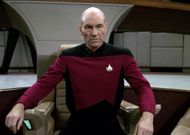On first glance, the parallel between George R.R. Martin and Star Trek: The Next Generation seems as different as Martians. Those who know Martin know that he wrote A Song of Ice and Fire, which spawned the HBO fantasy series Game of Thrones. While The Next Generation revitalised Gene Roddenberry's Star Trek, it not only paved the way for following series like Deep Space Nine and Voyager, but also pure cinematic gems like First Contact. What many Next Generation fans might not know is that one of their all-time favourite and most philosophical episodes, “The Measure of a Man” (Season 2), might never have been, at all, given a nudge from Martin.
George R.R. Martin's silver bullet advice
Melinda Snodgrass had her first credit as the series writer for Star Trek: The Next Generation, although she had already penned the sequel novel The Tears of the Singers for the Star Trek franchise. Basing the part on her own legal background, Snodgrass came up with a plot in a trial to determine whether android officer Data was the property of Starfleet or a sentient being with rights. Batol advised Captain Picard to defend Data, and Riker is required to argue the opposite stance in the courtroom. The courtroom scene included real legal tales from history, such as the infamous Dred Scott case.
At one point, Snodgrass had considered downplaying the gravity of her script. Thanks to an unexpected and essential piece of wisdom from George R.R. Martin, that changed all. Snodgrass (Season 2 Blu-ray extras) remembered Martin saying to her: "Never hoard your silver bullet." Encouraged, she put her best idea forward—and The Next Generation snapped up her script.. Not only did that get her on the Season 2 writing team, but it also earned her a spot as a Season 3 consulting producer.
A wild partnership beyond the final frontier
Well, Snodgrass and Martin had had it going on way before Star Trek. They co-edited the Wild Cards comic series in an alternate history sci-fi universe where an alien virus gave rise to humans ( "Aces") with superpowers and the tragically mutated ("Jokers"). The universe drew top-tier sci-fi heavyweights like Chris Claremont (X-Men) and Paul Cornell (Doctor Who). Peacock is preparing a TV adaptation of Wild Cards, where Snodgrass will executive produce the series and may extend their legacy together.
The enduring impact of "The Measure of a Man"

“Measure of a Man” was not just a high-water mark for Season Two; it preceded The Next Generation as a whole philosophically. The idea dug deep into the vein of The Original Series, and planted the seeds for future forays into Data's humanity that followed. Through episodes like "Offspring," in which Data creates a daughter called Lal, and the more prescribed "Brothers," which featured his other "twin," Lore, suffering from his condition, carried it forward. Even in Star Trek: First Contact, Data's longing for human attributes provided a temptation for the Borg Queen to offer him organic flesh.
The impact of “The Measure of a Man” goes well beyond Star Trek. Seth MacFarlane’s Ted 2 humorously nods to the episode as Ted battles to be legally recognised as a person. The movie even includes Star Trek veteran Michael Dorn, dressed in a budget-friendly version of his Worf costume, at a comic convention. MacFarlane’s passion for Trek is clear, with The Orville acting as his tribute to The Next Generation.
George R.R. Martin’s irony-laden Trek rejection

Ironically, Martin once tried to become a Star Trek: The Next Generation staff writer—but was rejected. As he explained during a workshop at UCSD’s Arthur C. Clarke Centre for Human Imagination:
“I had an interview with Star Trek: The Next Generation for a possible job as a staff writer. I remember coming in to the office of this producer – who thankfully did not last long on the show and you can see why when I tell the story. He said ‘I don’t know who you are can you tell me your credentials.’ And I said ‘I am just coming off Twilight Zone where I worked for a while, but before that I wrote novels and short stories. I am primarily a science fiction writer.’ And he said ‘Oh really, well Star Trek is not a science-fiction show, it is a people show.’ I was fooled by the photon torpedoes and starships. I was misled. Needless to say I did not get that job.”
Although George R.R. Martin never officially joined the Star Trek writers' room, his influence can be felt in one of its most memorable episodes. The next time you watch “The Measure of a Man,” remember that the creator of Westeros played a key role in defending Data’s humanity—and, in doing so, helped make Star Trek history.
